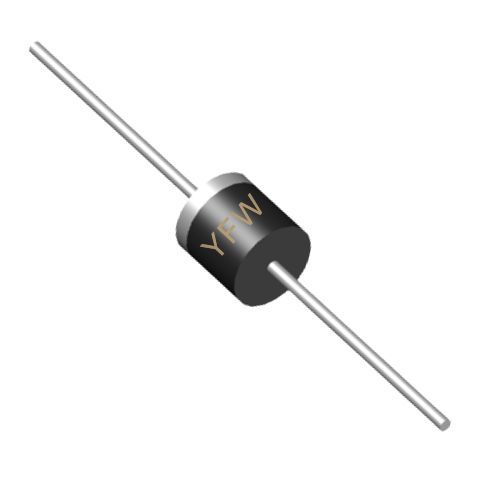One of the primary functions of NMOS in EV chargers is power factor correction (PFC). In AC-DC conversion stages, NMOS transistors are used in boost converters to rectify incoming AC voltage and stabilize the DC bus voltage. Their low RDS(on) (on-state resistance) and high switching speed minimize conduction and switching losses, improving overall efficiency. For instance, in three-phase PFC topologies like the Vienna rectifier, NMOS devices enable high power factor operation (typically >0.99) while reducing harmonic distortion .
Moreover, NMOS transistors handle high voltage and current demands in PFC circuits. For example, 600V-1200V rated NMOS (e.g., YFW’s YFW1N60MSI with 600V VDS and 1A ID) are essential for withstanding bus voltages and surge currents, ensuring robust performance in high-power DC chargers .
In
DC-DC converters, NMOS devices serve as
main switching elements in topologies like LLC resonant converters and interleaved multiphase buck converters. Their high-frequency switching capability (e.g., nanosecond-level switching times) allows for smaller magnetic components (inductors, transformers), reducing the size and weight of chargers. This is particularly critical for compact onboard chargers (OBCs) and high-power DC fast chargers .
NMOS transistors also enable
bidirectional energy flow in modern chargers, supporting vehicle-to-grid (V2G) applications. For example, in bidirectional
DC-DC converters, NMOS switches efficiently manage power transfer between the grid and the EV battery, ensuring optimal energy utilization .
NMOS devices act as smart switches in charging control circuits, enabling precise management of charging paths. They receive commands from the charger’s microcontroller to connect or disconnect the battery from the power source, ensuring safe and efficient charging. Their low gate threshold voltage (VGS(th))—typically 2.0–4.0V—simplifies driver circuit design and reduces power consumption in standby modes .
In safety-critical scenarios, such as overvoltage or overcurrent faults, NMOS transistors rapidly shut down the charging circuit to prevent damage. Their high avalanche energy tolerance (e.g., 250mJ in YFW’s HKTD5N50) ensures reliable protection against transient spikes .
NMOS transistors are integral to BMS for EVs, facilitating battery balancing and power distribution. For example, they activate 均衡电阻 to discharge overvoltage cells in series-connected battery packs, ensuring uniform capacity and extending battery lifespan. Additionally, NMOS-based load switches provide low-power operation in BMS sleep modes, minimizing standby power consumption .
In low-voltage BMS applications, NMOS devices with ultra-low leakage current (≤100nA) are preferred to reduce static battery drain. YFW’s YFW65R280, with its low RDS(on) and high-temperature stability, exemplifies this capability, supporting precise voltage regulation and long-term reliability .
NMOS transistors contribute to thermal efficiency through their low RDS(on) and high-temperature tolerance. For instance, devices like YFW’s YFW65R280 (with RDS(on) as low as 2mΩ) minimize heat generation during high-current operation, reducing the need for bulky heat sinks. This is crucial in outdoor charging stations exposed to extreme temperatures (-55°C to +150°C) .
Their rugged design and compliance with industry standards (e.g., RoHS, REACH) ensure long-term reliability in harsh environments. YFW’s NMOS products, backed by ISO 9001 and ISO 14001 certifications, meet stringent quality requirements for EV charging infrastructure .
As EV chargers evolve toward higher power density (e.g., 350kW+ ultra-fast chargers) and bidirectional capabilities, NMOS technology continues to advance. YFW’s portfolio of high-voltage, low-loss NMOS devices—such as the YFW1N60MSI and YFW65R280—addresses these trends by offering superior switching performance, thermal stability, and cost-effectiveness. By integrating these components into novel converter designs, YFW supports the development of compact, efficient, and grid-friendly charging solutions .
In conclusion, NMOS transistors are the backbone of modern EV chargers, driving efficiency, safety, and scalability. Their versatility in power conversion, control, and thermal management makes them indispensable in meeting the growing demands of the EV market. With YFW’s commitment to innovation and quality, the future of charging infrastructure is poised to become even more reliable and sustainable.
For cutting-edge NMOS solutions tailored for EV charging, explore YFW’s product line at www.yfwdiode.com. 